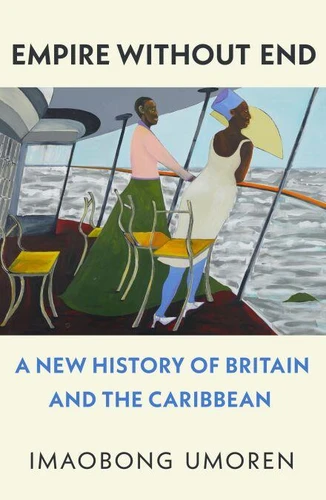Empire Without End. A New History of Britain and the Caribbean
Par :Formats :
Disponible dans votre compte client Decitre ou Furet du Nord dès validation de votre commande. Le format ePub protégé est :
- Compatible avec une lecture sur My Vivlio (smartphone, tablette, ordinateur)
- Compatible avec une lecture sur liseuses Vivlio
- Pour les liseuses autres que Vivlio, vous devez utiliser le logiciel Adobe Digital Edition. Non compatible avec la lecture sur les liseuses Kindle, Remarkable et Sony
- Non compatible avec un achat hors France métropolitaine
 , qui est-ce ?
, qui est-ce ?Notre partenaire de plateforme de lecture numérique où vous retrouverez l'ensemble de vos ebooks gratuitement
Pour en savoir plus sur nos ebooks, consultez notre aide en ligne ici
- Nombre de pages528
- FormatePub
- ISBN978-1-5299-2342-1
- EAN9781529923421
- Date de parution05/06/2025
- Protection num.Adobe DRM
- Infos supplémentairesepub
- ÉditeurVintage Digital
Résumé
A powerful and important reckoning with Britain's imperial legacy and contemporary systemic racism'A richly told history of Empire from which we cannot turn away' AFUA HIRSCH'I'd have loved to have read such a book when I was a schoolboy' COLIN GRANTFrom the 1500s to the mid-twentieth century, the events that took place in the Caribbean - from conquest, colonisation and capitalism to racial slavery, revolution and migration - and the people who forged them played a seminal role in creating modern Britain and the Anglophone Caribbean.
By the 1960s, Western global empires had begun to crumble. Yet the British Empire in the Caribbean did not end. Instead, colonialism was replaced with a new type of power whose impact can still be felt: neo-colonialism. Empire Without End offers a new interpretation of the British Empire, its enduring entanglement with the Anglophone Caribbean and the longevity of systemic racism. Taking a longer historical perspective starting in the period of European contact with the Caribbean and ending today, Imaobong Umoren looks at the impact and legacies of racial slavery to explore how later linked histories relating to capitalism, class, labour, war, political economy, poverty, gender and culture are crucial to telling the full story.
In doing so, she sets out a compelling strategy to define our roles and responsibilities in challenging the legacy of colonialism and hierarchy - a legacy that continues to blight our society and our politics.
By the 1960s, Western global empires had begun to crumble. Yet the British Empire in the Caribbean did not end. Instead, colonialism was replaced with a new type of power whose impact can still be felt: neo-colonialism. Empire Without End offers a new interpretation of the British Empire, its enduring entanglement with the Anglophone Caribbean and the longevity of systemic racism. Taking a longer historical perspective starting in the period of European contact with the Caribbean and ending today, Imaobong Umoren looks at the impact and legacies of racial slavery to explore how later linked histories relating to capitalism, class, labour, war, political economy, poverty, gender and culture are crucial to telling the full story.
In doing so, she sets out a compelling strategy to define our roles and responsibilities in challenging the legacy of colonialism and hierarchy - a legacy that continues to blight our society and our politics.
A powerful and important reckoning with Britain's imperial legacy and contemporary systemic racism'A richly told history of Empire from which we cannot turn away' AFUA HIRSCH'I'd have loved to have read such a book when I was a schoolboy' COLIN GRANTFrom the 1500s to the mid-twentieth century, the events that took place in the Caribbean - from conquest, colonisation and capitalism to racial slavery, revolution and migration - and the people who forged them played a seminal role in creating modern Britain and the Anglophone Caribbean.
By the 1960s, Western global empires had begun to crumble. Yet the British Empire in the Caribbean did not end. Instead, colonialism was replaced with a new type of power whose impact can still be felt: neo-colonialism. Empire Without End offers a new interpretation of the British Empire, its enduring entanglement with the Anglophone Caribbean and the longevity of systemic racism. Taking a longer historical perspective starting in the period of European contact with the Caribbean and ending today, Imaobong Umoren looks at the impact and legacies of racial slavery to explore how later linked histories relating to capitalism, class, labour, war, political economy, poverty, gender and culture are crucial to telling the full story.
In doing so, she sets out a compelling strategy to define our roles and responsibilities in challenging the legacy of colonialism and hierarchy - a legacy that continues to blight our society and our politics.
By the 1960s, Western global empires had begun to crumble. Yet the British Empire in the Caribbean did not end. Instead, colonialism was replaced with a new type of power whose impact can still be felt: neo-colonialism. Empire Without End offers a new interpretation of the British Empire, its enduring entanglement with the Anglophone Caribbean and the longevity of systemic racism. Taking a longer historical perspective starting in the period of European contact with the Caribbean and ending today, Imaobong Umoren looks at the impact and legacies of racial slavery to explore how later linked histories relating to capitalism, class, labour, war, political economy, poverty, gender and culture are crucial to telling the full story.
In doing so, she sets out a compelling strategy to define our roles and responsibilities in challenging the legacy of colonialism and hierarchy - a legacy that continues to blight our society and our politics.



